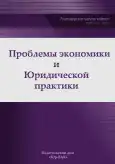Digital Platforms of Creative Industries: The Experience of Russia and China
- Authors: Gumerova G.I.1, Kokurina A.A.2, Shaimieva E.S.2, Trifonova N.N.1
-
Affiliations:
- Financial University under the Government of the Russian Federation
- Kazan Innovation University named after V.G. Timiryasov (IEUP)
- Issue: Vol 19, No 1 (2023)
- Pages: 293-300
- Section: Management
- URL: https://journal-vniispk.ru/2541-8025/article/view/250157
- ID: 250157
Cite item
Abstract
The paper provides a critical analysis of the subject areas «digital platforms of creative industries», «platforms of creative industries»; formulated discussion questions in the field of the subject, the object of research. The object of the research is digital platforms of creative industries as designers of their online business development. The subject is digital platforms, the diversity of which contributes to the development of various types of economic activity of creative industries. Research methods: analysis, synthesis, classification. The objectives of the study are: actualization of research in the subject area of this study, namely: digital platforms in the development of creative industries in relation to Russian practice and China; formation of a classification of digital platforms of creative industries. In the work, a classification of digital platforms of creative industries is formed, with the allocation of universal and specialized platforms. The paper systematizes the material on digital platforms of creative industries (universal and specialized) in the practice of Russian companies of creative industries, Chinese. The work uses materials from the Scientific Electronic Library (NEB); the result of the project of the NAFI Publishing House (with the support of Google) (2021).
Full Text
##article.viewOnOriginalSite##About the authors
Guzel I. Gumerova
Financial University under the Government of the Russian Federation
Author for correspondence.
Email: GIGumerova@fa.ru
ORCID iD: 0000-0002-5198-7576
SPIN-code: 4426-5494
Scopus Author ID: 6506026980
ResearcherId: H-6985-2017
Dr. Sci. (Econ.), Professor; Professor of the Department of Management and Innovation
Russian Federation, MoscowAnastasiia A. Kokurina
Kazan Innovation University named after V.G. Timiryasov (IEUP)
Email: suleimanova@ieml.ru
ORCID iD: 0000-0002-6402-6977
SPIN-code: 6224-5943
Associate Professor of the Department of Theory and Methods of Teaching Foreign Languages, Director of the Chinese Language Center
Russian Federation, KazanElmira Sh. Shaimieva
Kazan Innovation University named after V.G. Timiryasov (IEUP)
Email: shaimieva@ieml.ru
ORCID iD: 0000-0002-9588-0199
SPIN-code: 5592-5270
Scopus Author ID: 56644835900
ResearcherId: P-7565-2015
Dr. Sci. (Econ.), Associate Professor; Professor of the Department of Management, Head of the Research Laboratory of Knowledge Management of the Faculty of Management and Engineering Business
Russian Federation, KazanNatalia N. Trifonova
Financial University under the Government of the Russian Federation
Email: nntrifonova@fa.ru
SPIN-code: 7117-5321
Assistant of the Department of Management and Innovation
Russian Federation, MoscowReferences
- Atlas of creative industries in the Russian Federation // Center of Urban Competencies of ANO «Agency for Strategic Initiatives for the Promotion of new Projects» M. 2021. 555 p.
- Bredikhin S.V., Vlasova V.V., Gavrilova N.V., Gershman M.A., Gokhberg L.M., Demyanova A.V., Ivanova I.A., Popova Ya.A. Development of creative industries in Russia: key indicators. Scientific Digest No. 1 // HSE, Center for Interdisciplinary Research of Human Potential. 2021. 21 p.
- Contribution of digital platforms to the development of creative industries and support of creative entrepreneurship / G. R. Imaeva, E. Y. Sushko, I. A. Hildebrandt, L. V. Spiridonova, L. R. Baymuratova. Moscow: NAFI Publishing House, 2021. —84 p.
- Gumerova G.I., Shaimieva E.S. Approaches to the study of creative industries in the digital economy // the article is under review.
- Gumerova G.I., Shaimieva E.S. The intellectual component of Russian creative industries in the period of their formation // Bulletin of the Voronezh State University. Series: Economics and Management. 2022. No. 3. pp. 129–143.
- Gumerova G.I., Butneva A.Yu., Shaimieva E.Sh., Litvin I.Yu., Trifonova N.N. Creative industries and digital economy: interaction, research problems. Tools for the development of creative industries (Russian practice) // Problems of Economics and legal practice, 2022. No. 5 pp. 265–270.
- Zhuparova A.S., Nusyupaeva A.A. Comparative analysis of the development of creative industries in China and the UK// Models, systems, networks in economics, technology, nature and society. 2020. No. 3 (35). pp. 46–53.
- Kanner D.D., Lysochenko A.A. EVENT-agencies as a central element of a creative cluster // Russian Economic Bulletin. 2021. Vol. 4. No. 4. pp. 202–205.
- Nemirovskaya E.P., Ashutova T.V. Analysis of the possibilities of a crowdsourcing educational platform as an innovative product in the context of the networking of educational activities at the university // Baikal Research Journal. 2022. Vol. 13. No. 1. (accessed 25.12.2022).
- Pogorletsky A.I., Dai Xiaofeng Development experience and prospects of cooperation between China and Russia in the field of creative economy // Issues of innovative economy. 2020. Volume 10. No. 2. pp. 757-772. —doi: 10.18334/vinec.10.2.100928 // [Electronic resource]. Access mode: URL: https://1economic.ru/lib/100928 (accessed 05.02.2023).
- Pekhtereva E.A. The virtual sector of the creative economy of China (the economy of creaters) // Economic and social problems of Russia. —2022. No. 4. pp. 94–113.
- Semenova D.A., Nikiforova S.V. The formation of the event industry in the cultural practices of the region // International Scientific Research Journal. 2022. No. 12 (126).
- Tarbaeva M.B., Yamanova E.B. History of the development of creative industries in Russia and China// In the collection: Creative strategies and creative industries in the economic, social and cultural spaces of the region. materials of the Third regional scientific and practical conference. Irkutsk, 2021. pp. 329–333.
- Fazylzyanova G.I. Design thinking as a philosophy and methodology of digital society // Economic and Socio-humanitarian Studies No. 1 (25) 2020 pp. 101–109.
- Shevchuk A.V. From factory to platform: autonomy and control in the digital economy // Sociology of Power. 2020. Vol. 32. No. 1. pp. 30–54. // doi: 10.22394/2074-0492-2020-1-30-54.
- Shelyugina O.A., Belyaeva Yu.P. Promotion of projects in the field of decorative art on web platforms// Works of young scientists of Altai State University. 2021. No. 18. pp. 98–101.
- Yakushina N. P. Art market in the era of digitalization: new trends and prospects // Bulletin of the Moscow State University of Culture and Arts. 2021. No. 1 (99). pp. 143–150. https://doi.org/:10.24412/1997-0803-2021-199-143-150.
Supplementary files









